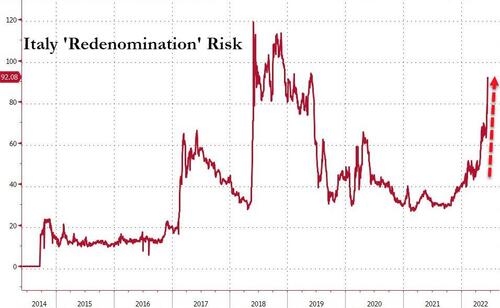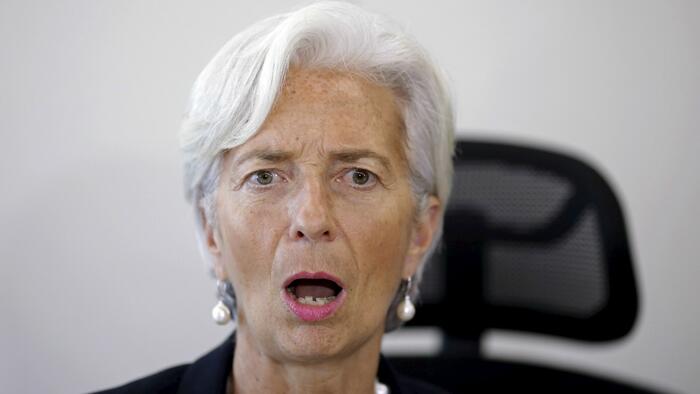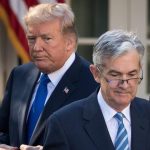Last week, shortly after the ECB’s latest meeting disappointed markets and concluded without a discussion of Europe’s growing bond market fragmentation which has since sent Italian bond yields soaring above 4%, we joked that “at this rate the ECB would make an emergency rate cut” just hours after announcing an end to QT and guiding to a July rate hike.
At the rate European bonds are imploding, the ECB will make an emergency rate cut by 4pm
— zerohedge (@zerohedge) June 9, 2022
Once again, our jokes was not too far from the truth because on Wednesday morning, just hours before the Fed’s first 75bps rate hike sine 1994, and with Italian bonds in freefall, European Central Bank unexpectedly announced it would hold an emergency , ad hoc meeting of its rate-setters starting 11am CET in which it would “discuss current market conditions.”
The meeting, which comes less than a week after the rate-setting governing council’s last vote, raised investor expectations that the central bank is preparing to announce a policy instrument to stave-off another debt crisis in the region, which can only come in the form of more QE… which is ironic at a time when the ECB just announced it was phasing out all QE!
Italian government bonds rallied in price following news of the planned meeting, reversing some of the recent sell-off that analysts said brought the country’s borrowing costs towards the “danger zone”. Gilles Moec, chief economist at Axa, an insurer, said the “stakes are high” for the ECB “now that everyone is dusting off their debt sustainability spreadsheets for Italy, they probably need to go up an extra notch”.
Commenting on the move, SocGen’s Kit Juckes writes that “the ECB’s carefully-communicated strategy was to end asset purchases, then raise rates, starting in small increments and accelerating if needed. That would allow an escape from the current extraordinary policy regime. This strategy is in all sorts of trouble today as the ECB meet to discuss their anti-fragmentation policy and tools.“
He added that while “the euro likes the news, because BTPs like it and as peripheral spreads narrow, the euro can bounce.” But the need to prepare the ground to defend the Eurozone bond market highlights the ECB’s dilemma: “How can you use monetary policy both to target inflation and to target bond market stability? And how can you stave off fragmentation without easing monetary conditions through additional bond purchases? If the stability of the bond market is more important than the ECB’s inflation mandate, it can stymie monetary policy normalisation, until there’s a fiscal, as opposed to a monetary solution to the euro’s Achilles Heel.”
Indeed, as we have been joking for months, for the ECB this boils down to a choice between fighting inflation and keeping the Eurozone from disintegrating.
ECB WILL DISCUSS CRISIS STRATEGY AS WELL AS PEPP REINVESTMENTS
Translation: ECB will discuss how to raise rates while boosting QE. Coming to every central bank near you
— zerohedge (@zerohedge) June 15, 2022
The 10-year yield on Italian government bonds fell about 0.2 percentage points in choppy early trading on Wednesday to about 3.87 per cent, according to Tradeweb data. It had risen to almost 4.2% in the previous session from just over 1 per cent at the end of 2021.
‘Italeave’ risks remain extremely elevated relative to post-crisis history…

Breathing a sigh of relief that the ECB won’t let the eurozone implode, the euro reversed some of its losses, rising 0.6% against the dollar to $1.047 early on Wednesday after the ECB statement was reported by newswires. European bank shares also rose on Wednesday. The Euro Stoxx Banks index gained 3.7 per cent with big Italian lenders UniCredit and Intesa Sanpaolo jumping more than 6 per cent.
ECB executive board member Isabel Schnabel indicated in a speech on Tuesday evening that the central bank was getting closer to the point where it would intervene in bond markets, saying “some borrowers have seen significantly larger changes in financing conditions than others since the start of the year”.
She added: “Such changes in financing conditions may constitute an impairment in the transmission of monetary policy that requires close monitoring.”
Schnabel, the ECB executive who oversees its market operations and one of the most influential voices on its board, said the central bank’s commitment to the euro had no limits. “And our track record of stepping in when needed backs up this commitment,” she added.
But wait, this means… more QE at a time when the ECB just vowed… less QE!!??
And while we wait for the dazed and confused ECB to announce its decision which is due any minute, we can’t help but agree with Bloomberg which notes that “the risk for markets is that the central bank over-delivers. The sources stories we have seen this morning, plus the comments from Wunsch, suggest that this may end up being something of a damp squib. Italy’s 10-year yield is currently trading just below 4%, and is still 60 bps above Thursday’s pre-decision level. If markets have this right and there’s not much new coming today, then there has to be questions asked about why the meeting is being held at all. An emergency meeting that amounts to little more than re-reading from last week’s press conference would only further damage the central bank’s already creaking credibility. Presuming that the governing council members know this, they also know that they are in a position where over-delivering is the only way to maintain credibility.”
We don’t know about any of that, we just know that the central bank is trapped, and that any further push to contain inflation will mean the continent’s bonds will only accelerate their free fall; alternatively if the ECB – like the BOJ – picks bond market stability, it can kiss its inflation mandate goodbye, as the world reverts to a reality where much higher structural inflation is the norm.











